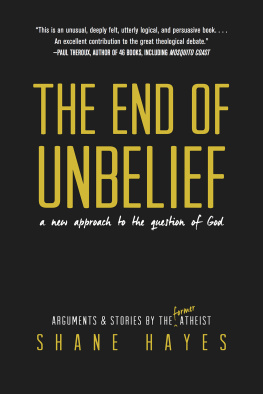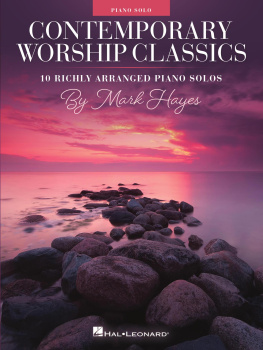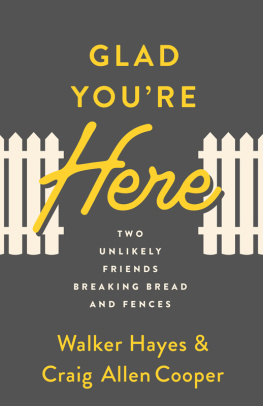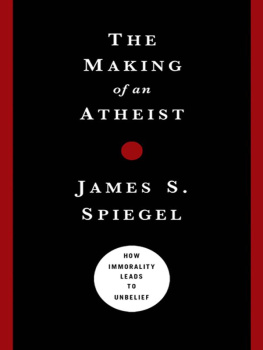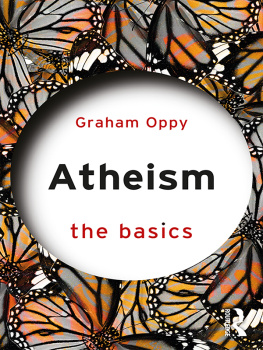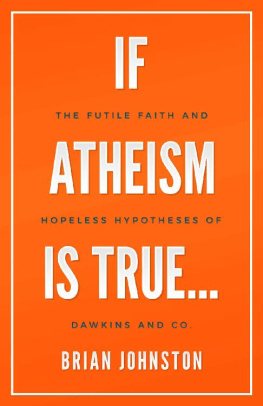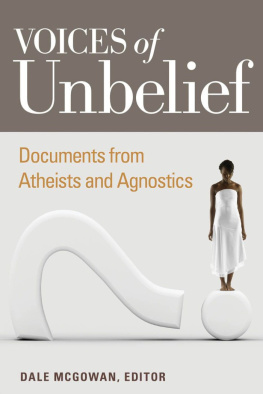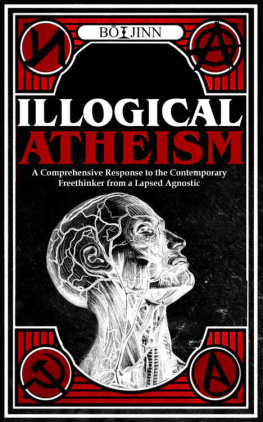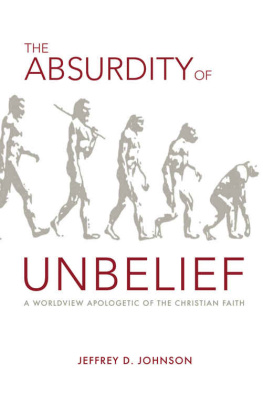The American Heritage Dictionary. New York: Dell, 2001.
Barth, Karl. Dogmatics in Outline. New York: Harper & Row, 1959.
Bryson, Bill. A Short History of Nearly Everything. New York: Broadway Books, 2003.
Burtt, E. A., ed., The Teachings of the Compassionate Buddha. New York: New American Library, 1955.
Catholic Encyclopedia. Vol. 1 and vol. 12. New York: Robert Appleton, 1907 and 1912.
Dawkins, Richard. The God Delusion. New York: Houghton Mifflin, 2006.
Dennett, Daniel C. Breaking the Spell: Religion as a Natural Phenomenon.
New York: Penguin, 2006.
Dostoyevsky, Fyodor. The Brothers Karamazov. New York: New American Library, 1958.
Eaken, Emily. So Gods Really in the Details? New York Times. May 11, 2002: B9.
Harris, Sam. The End of Faith. New York: W. W. Norton, 2004.
Haught, John F. God and the New Atheism: A Critical Response to Dawkins, Harris, and Hitchens. Louisville, KY: Westminster John Knox, 2008.
Hawking, Stephen, and Leonard Mlodinow. The Grand Design. New York: Bantam, 2010.
Hitchens, Christopher. God Is Not Great: How Religion Poisons Everything. New York: Hachette, 2007.
Isherwood, Christopher and Swami Prabhavananda, trans. Baghavad-Gita:The Song of God. New York: Mentor Books, 1959.
James, William. The Varieties of Religious Experience. New York: Modern Library, 1902.
Keats, John. Letter to George and Georgiana Keats. Selected Poems and Letters. Ed. Douglas Bush. Boston: Houghton Mifflin, 1959. 283.
Lawrence, D. H. Selected Poems. New York: Viking, 1959.
Mascaro, Juan, trans. The Upanishads. London: Penguin, 1965.
Merton, Thomas. New Seeds of Contemplation. New York: New Directions, 1961.
. Seeds of Contemplation. Norfolk, CT: New Directions Books, 1949.
. The Seven Storey Mountain. New York: Harcourt, Brace, 1948.
. Thoughts in Solitude. New York: Farrar, Strauss and Cudahy, 1956.
. The Waters of Siloe. New York: Harcourt, Brace, 1949.
Nietzsche, Friedrich. Beyond Good and Evil. Chicago: Henry Regnery, 1955.
Patton, Laurie L., trans. The Baghavad Gita. London: Penguin Classics, 2008.
Peale, Norman Vincent. Never Let Anything Get You Down (a sermon). Pawling, NY: Foundation for Christian Living, 1967.
Shorter Oxford English Dictionary. 5th ed. New York: Oxford University Press, 2002.
Simmons, Ernest J. Leo Tolstoy. New York: Vintage Books, 1960.
St. John of the Cross. Dark Night of the Soul. Mineola, NY: Dover, 2003.
Stenger, Victor J. God:The Failed Hypothesis: How Science Shows that God Does Not Exist. Amherst, NY: Prometheus Books, 2008.
Underhill, Evelyn. Practical Mysticism. New York: E. P. Dutton, 1960.
Walsh, James, trans. The Cloud of Unknowing. Mahwah, NJ: Paulist Press, 1981.
T his book has five discrete units, written at different periods of my life over half a century. All deal with the question of Gods existence and the profound impact of belief or unbelief on a human life.
Part One is pure argument. It takes on the New Atheism, showing that it is a belief system, not a proven theory, and that it offers less to rational thinkers than faith in God does.
Part Two is a memoir told in fictional form. It tells how a fiercely ardent Catholic faith caused a crisis in my life at seventeen (I nearly entered a Trappist monastery) and how it was resolved. The influence of Thomas Merton, the famous Trappist monk and author, was central to the conflict. I include a sketch of the man and our meeting in the story.
Part Three is a blend of argument and memoir. It describes my passage through atheism, Hinduism, and Buddhism, to Pure Theismwhich I describe in Part Oneand finally back to Christianity. I dramatize and debate the problem of evil in a courtroom scene with God as defendant.
Part Four narrates a believers last and finest hour.
Part Five shows how one who is philosophically agnostic yet passionately Christian sees the life and mission of Christ.
W e are nocturnal creatures. Darkness is our element. The future is shrouded in deep mist and shadow. We cant see very clearly and we cant see very far, so we feel our way, grope, and guess at whats ahead. Faith is our candle, flickering, dim, uncertain, but necessary. Faith in science, faith in our intuitions and calculations, faith in luck, faith in God. There are many kinds of faith. We live by one or more of them. Without it we weaken, we fall, we perish.
Not only Scripture but all of human experience tells us we need something strong, good, and wise to believe in. For some, its a statue of Zeus or Sophia; for some, kinetic theory and the empirical method; for some, the writings of a brilliant atheist; for some, Confucius, Buddha, Allah, the God of Abraham, or (for me) Christ. To believe is to hold as true what cannot yet be verified. Its a conviction, a sense of direction, that helps us move bravely through our darkness. And face what lies beyond itthe blackness of utter extinction or endless light.
I n 2004, The End of Faith by Sam Harris becomes an international bestseller. The New Atheism soon is trumpeted by other eloquent voices: Dawkins (The God Delusion), Hitchens (God Is Not Great), Dennett (Breaking the Spell), and Stenger (God: The Failed Hypothesis). Essays proclaiming there are no good arguments for Gods existence appear on oped pages of large metropolitan dailies. Three close friends surround me after dinner and declare that Christians give only inane reasons for believing in God in the face of human suffering and tragedy.
The tide of modern intellectual culture flows strongly toward atheism, a destination congenial to some but abhorrent to others. For me, it was like Antarcticaglacially cold and wind lashed, an icebound waste devoid of tree, shrub, or flower, no hint of blossoming life visible on the horizon, and beyond the horizon nothing. I endured my own atheism for most of a decade. Then, drawn homeward, I swam against the tide for years, made a grueling journey back to the island of faithfor me, a lush Capri of the soul. Drifting with the tide is pleasant and easy, but is atheism where you want to go? Or stay?
What Agnostic Really Means
I am a Christian. And I am an agnostic. I hold as true what cannot yet be verified. An agnostic is one who says we cant know whether there is a God or not. His existence cant be proven, and it cant be disproven. Thomas Aquinas gave reasons to believe in God. I see the best of them as strong arguments, but not proofs. Bertrand Russell, a great proponent of atheism, admitted he couldnt be absolutely sure God doesnt exist. Chapter 4 of Dawkinss book is entitled Why There Is Almost Certainly No God. Almost certainly. Dawkins isnt sure, either.
Since none of us can know, the great question isnt to be or not to be, but to believe or not to believe. I believe. Atheists choose not to believe. I cant tell them theyre wrong, and they cant tell me Im wrong. We all grope in existential darkness. I use religious faith as a compass. They think its worthless.
I dont say everyone should believe as I do. Im a pragmatist, not an evangelist. I know how different people are. My solution may not be yours. But of this Im sure: believing in God can enrich the lives of many who have ignored or rejected that option.

